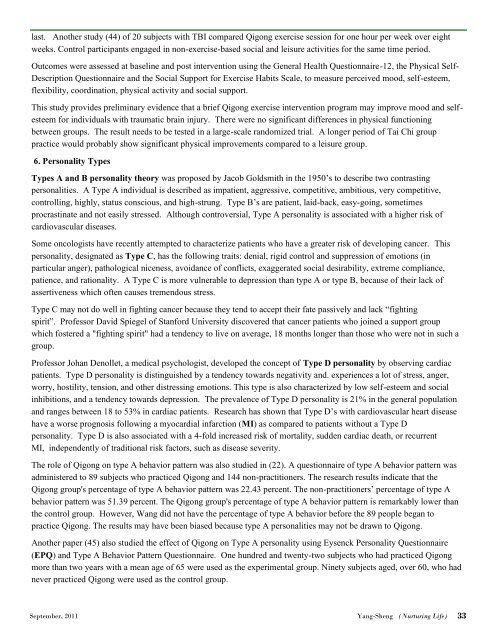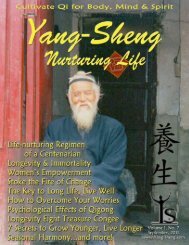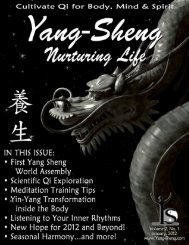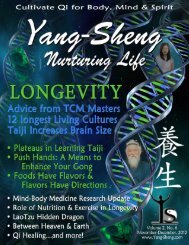Click to download the entire September issue as a PDF - Yang-Sheng
Click to download the entire September issue as a PDF - Yang-Sheng
Click to download the entire September issue as a PDF - Yang-Sheng
You also want an ePaper? Increase the reach of your titles
YUMPU automatically turns print PDFs into web optimized ePapers that Google loves.
l<strong>as</strong>t. Ano<strong>the</strong>r study (44) of 20 subjects with TBI compared Qigong exercise session for one hour per week over eight<br />
weeks. Control participants engaged in non-exercise-b<strong>as</strong>ed social and leisure activities for <strong>the</strong> same time period.<br />
Outcomes were <strong>as</strong>sessed at b<strong>as</strong>eline and post intervention using <strong>the</strong> General Health Questionnaire-12, <strong>the</strong> Physical Self-<br />
Description Questionnaire and <strong>the</strong> Social Support for Exercise Habits Scale, <strong>to</strong> me<strong>as</strong>ure perceived mood, self-esteem,<br />
flexibility, coordination, physical activity and social support.<br />
This study provides preliminary evidence that a brief Qigong exercise intervention program may improve mood and selfesteem<br />
for individuals with traumatic brain injury. There were no significant differences in physical functioning<br />
between groups. The result needs <strong>to</strong> be tested in a large-scale randomized trial. A longer period of Tai Chi group<br />
practice would probably show significant physical improvements compared <strong>to</strong> a leisure group.<br />
6. Personality Types<br />
Types A and B personality <strong>the</strong>ory w<strong>as</strong> proposed by Jacob Goldsmith in <strong>the</strong> 1950’s <strong>to</strong> describe two contr<strong>as</strong>ting<br />
personalities. A Type A individual is described <strong>as</strong> impatient, aggressive, competitive, ambitious, very competitive,<br />
controlling, highly, status conscious, and high-strung. Type B’s are patient, laid-back, e<strong>as</strong>y-going, sometimes<br />
procr<strong>as</strong>tinate and not e<strong>as</strong>ily stressed. Although controversial, Type A personality is <strong>as</strong>sociated with a higher risk of<br />
cardiov<strong>as</strong>cular dise<strong>as</strong>es.<br />
Some oncologists have recently attempted <strong>to</strong> characterize patients who have a greater risk of developing cancer. This<br />
personality, designated <strong>as</strong> Type C, h<strong>as</strong> <strong>the</strong> following traits: denial, rigid control and suppression of emotions (in<br />
particular anger), pathological niceness, avoidance of conflicts, exaggerated social desirability, extreme compliance,<br />
patience, and rationality. A Type C is more vulnerable <strong>to</strong> depression than type A or type B, because of <strong>the</strong>ir lack of<br />
<strong>as</strong>sertiveness which often causes tremendous stress.<br />
Type C may not do well in fighting cancer because <strong>the</strong>y tend <strong>to</strong> accept <strong>the</strong>ir fate p<strong>as</strong>sively and lack ―fighting<br />
spirit‖. Professor David Spiegel of Stanford University discovered that cancer patients who joined a support group<br />
which fostered a "fighting spirit" had a tendency <strong>to</strong> live on average, 18 months longer than those who were not in such a<br />
group.<br />
Professor Johan Denollet, a medical psychologist, developed <strong>the</strong> concept of Type D personality by observing cardiac<br />
patients. Type D personality is distinguished by a tendency <strong>to</strong>wards negativity and. experiences a lot of stress, anger,<br />
worry, hostility, tension, and o<strong>the</strong>r distressing emotions. This type is also characterized by low self-esteem and social<br />
inhibitions, and a tendency <strong>to</strong>wards depression. The prevalence of Type D personality is 21% in <strong>the</strong> general population<br />
and ranges between 18 <strong>to</strong> 53% in cardiac patients. Research h<strong>as</strong> shown that Type D’s with cardiov<strong>as</strong>cular heart dise<strong>as</strong>e<br />
have a worse prognosis following a myocardial infarction (MI) <strong>as</strong> compared <strong>to</strong> patients without a Type D<br />
personality. Type D is also <strong>as</strong>sociated with a 4-fold incre<strong>as</strong>ed risk of mortality, sudden cardiac death, or recurrent<br />
MI, independently of traditional risk fac<strong>to</strong>rs, such <strong>as</strong> dise<strong>as</strong>e severity.<br />
The role of Qigong on type A behavior pattern w<strong>as</strong> also studied in (22). A questionnaire of type A behavior pattern w<strong>as</strong><br />
administered <strong>to</strong> 89 subjects who practiced Qigong and 144 non-practitioners. The research results indicate that <strong>the</strong><br />
Qigong group's percentage of type A behavior pattern w<strong>as</strong> 22.43 percent. The non-practitioners’ percentage of type A<br />
behavior pattern w<strong>as</strong> 51.39 percent. The Qigong group's percentage of type A behavior pattern is remarkably lower than<br />
<strong>the</strong> control group. However, Wang did not have <strong>the</strong> percentage of type A behavior before <strong>the</strong> 89 people began <strong>to</strong><br />
practice Qigong. The results may have been bi<strong>as</strong>ed because type A personalities may not be drawn <strong>to</strong> Qigong.<br />
Ano<strong>the</strong>r paper (45) also studied <strong>the</strong> effect of Qigong on Type A personality using Eysenck Personality Questionnaire<br />
(EPQ) and Type A Behavior Pattern Questionnaire. One hundred and twenty-two subjects who had practiced Qigong<br />
more than two years with a mean age of 65 were used <strong>as</strong> <strong>the</strong> experimental group. Ninety subjects aged, over 60, who had<br />
never practiced Qigong were used <strong>as</strong> <strong>the</strong> control group.<br />
<strong>September</strong>, 2011 <strong>Yang</strong>-<strong>Sheng</strong> (Nurturing Life) 33













